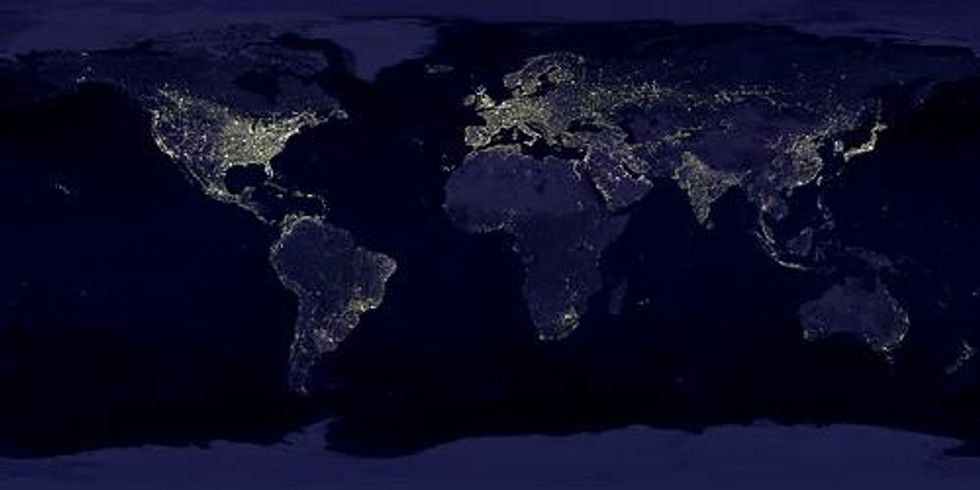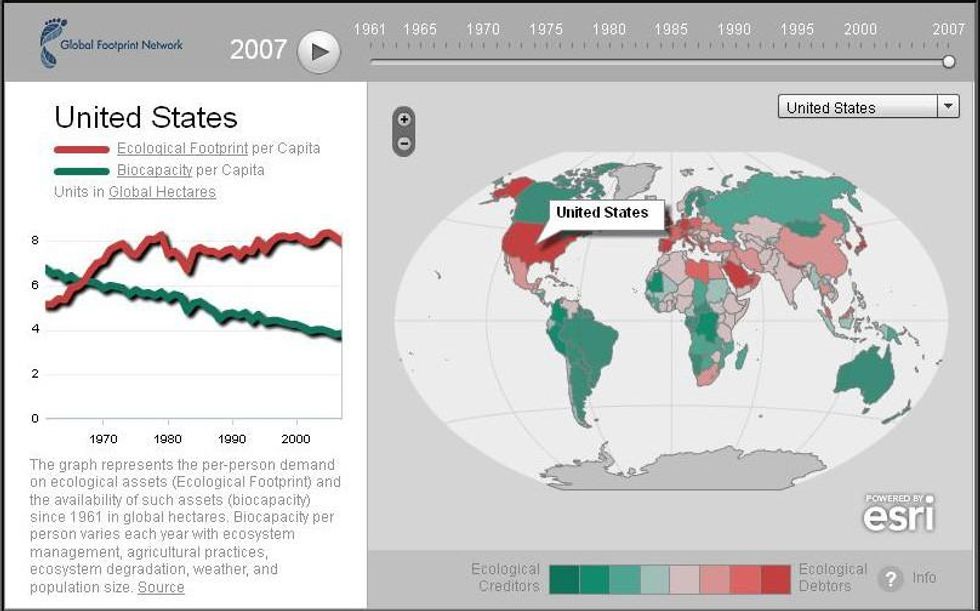Aug 20, 2013

"It is like having a bank account," Juan Carlos Morales of the independent think tank Global Footprint Network told Common Dreams. "If you don't have money available, you have to take out credit. We are depleting resources faster than Earth can regenerate."
The concept, originally developed by the New Economics Foundation and carried forward by the Global Footprint Network, reveals a disturbing trend. "Earth Overshoot Day," also called "Ecological Debt Day," is arriving earlier each year since it was first calculated in 1987, roughly three days earlier each year since 2011. Global Footprints says this trend is unequivocal since "Human consumption began outstripping what the planet could reproduce" in the mid-1970s.
"We are now operating in overdraft," reads a Global Footprints statement. "For the rest of the year, we will maintain our ecological deficit by drawing down local resource stocks and accumulating carbon dioxide in the atmosphere."
Global Footprints calculates the day of overdraft based on analysis of consumption and production patterns of each country. "Every scientific model used to account for human demand and nature's supply shows a consistent trend: We are well over budget, and that debt is compounding," reads an organizational statement. "It is an ecological debt, and the interest we are paying on that mounting debt--food shortages, soil erosion, and the build-up of CO2 in our atmosphere--comes with devastating human and monetary costs."
Not all countries borrow equally, with Europe, North America, and Qatar consuming at notably destructive paces. According to Global Footprints, if everyone in the world consumed on par with the United States, it would take four Earths to sustain the international population.
"Regardless of consumption patterns, it is still a global problem that affects everyone," explains Morales. "We all have responsibility to address it."

_____________________
An Unconstitutional Rampage
Trump and Musk are on an unconstitutional rampage, aiming for virtually every corner of the federal government. These two right-wing billionaires are targeting nurses, scientists, teachers, daycare providers, judges, veterans, air traffic controllers, and nuclear safety inspectors. No one is safe. The food stamps program, Social Security, Medicare, and Medicaid are next. It’s an unprecedented disaster and a five-alarm fire, but there will be a reckoning. The people did not vote for this. The American people do not want this dystopian hellscape that hides behind claims of “efficiency.” Still, in reality, it is all a giveaway to corporate interests and the libertarian dreams of far-right oligarchs like Musk. Common Dreams is playing a vital role by reporting day and night on this orgy of corruption and greed, as well as what everyday people can do to organize and fight back. As a people-powered nonprofit news outlet, we cover issues the corporate media never will, but we can only continue with our readers’ support. |
Our work is licensed under Creative Commons (CC BY-NC-ND 3.0). Feel free to republish and share widely.
Sarah Lazare
Sarah Lazare was a staff writer for Common Dreams from 2013-2016. She is currently web editor and reporter for In These Times.

"It is like having a bank account," Juan Carlos Morales of the independent think tank Global Footprint Network told Common Dreams. "If you don't have money available, you have to take out credit. We are depleting resources faster than Earth can regenerate."
The concept, originally developed by the New Economics Foundation and carried forward by the Global Footprint Network, reveals a disturbing trend. "Earth Overshoot Day," also called "Ecological Debt Day," is arriving earlier each year since it was first calculated in 1987, roughly three days earlier each year since 2011. Global Footprints says this trend is unequivocal since "Human consumption began outstripping what the planet could reproduce" in the mid-1970s.
"We are now operating in overdraft," reads a Global Footprints statement. "For the rest of the year, we will maintain our ecological deficit by drawing down local resource stocks and accumulating carbon dioxide in the atmosphere."
Global Footprints calculates the day of overdraft based on analysis of consumption and production patterns of each country. "Every scientific model used to account for human demand and nature's supply shows a consistent trend: We are well over budget, and that debt is compounding," reads an organizational statement. "It is an ecological debt, and the interest we are paying on that mounting debt--food shortages, soil erosion, and the build-up of CO2 in our atmosphere--comes with devastating human and monetary costs."
Not all countries borrow equally, with Europe, North America, and Qatar consuming at notably destructive paces. According to Global Footprints, if everyone in the world consumed on par with the United States, it would take four Earths to sustain the international population.
"Regardless of consumption patterns, it is still a global problem that affects everyone," explains Morales. "We all have responsibility to address it."

_____________________
Sarah Lazare
Sarah Lazare was a staff writer for Common Dreams from 2013-2016. She is currently web editor and reporter for In These Times.

"It is like having a bank account," Juan Carlos Morales of the independent think tank Global Footprint Network told Common Dreams. "If you don't have money available, you have to take out credit. We are depleting resources faster than Earth can regenerate."
The concept, originally developed by the New Economics Foundation and carried forward by the Global Footprint Network, reveals a disturbing trend. "Earth Overshoot Day," also called "Ecological Debt Day," is arriving earlier each year since it was first calculated in 1987, roughly three days earlier each year since 2011. Global Footprints says this trend is unequivocal since "Human consumption began outstripping what the planet could reproduce" in the mid-1970s.
"We are now operating in overdraft," reads a Global Footprints statement. "For the rest of the year, we will maintain our ecological deficit by drawing down local resource stocks and accumulating carbon dioxide in the atmosphere."
Global Footprints calculates the day of overdraft based on analysis of consumption and production patterns of each country. "Every scientific model used to account for human demand and nature's supply shows a consistent trend: We are well over budget, and that debt is compounding," reads an organizational statement. "It is an ecological debt, and the interest we are paying on that mounting debt--food shortages, soil erosion, and the build-up of CO2 in our atmosphere--comes with devastating human and monetary costs."
Not all countries borrow equally, with Europe, North America, and Qatar consuming at notably destructive paces. According to Global Footprints, if everyone in the world consumed on par with the United States, it would take four Earths to sustain the international population.
"Regardless of consumption patterns, it is still a global problem that affects everyone," explains Morales. "We all have responsibility to address it."

_____________________
We've had enough. The 1% own and operate the corporate media. They are doing everything they can to defend the status quo, squash dissent and protect the wealthy and the powerful. The Common Dreams media model is different. We cover the news that matters to the 99%. Our mission? To inform. To inspire. To ignite change for the common good. How? Nonprofit. Independent. Reader-supported. Free to read. Free to republish. Free to share. With no advertising. No paywalls. No selling of your data. Thousands of small donations fund our newsroom and allow us to continue publishing. Can you chip in? We can't do it without you. Thank you.